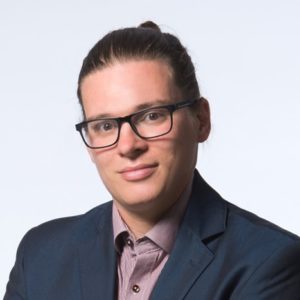 Matthias Hartlieb received his PhD in Chemistry in 2015 at the Friedrich Schiller-University in Jena. He proceeded to work as a DFG-funded postdoctoral research fellow at the University of Warwick followed by a research position at the Helmholtz Zentrum Geesthacht. He joined the University of Potsdam in 2019 as an Open-Topic Postdoc and, since 2021, he leads an Emmy Noether research group at Potsdam. His research interests are the design of functional polymeric (bio)materials, specifically in the areas of antimicrobial polymers and supramolecular polymers, using tools such as (photo)-RAFT polymerization or solid phase synthesis. More information can be found on his group website and on Twitter @PolyBioPotsdam.
Matthias Hartlieb received his PhD in Chemistry in 2015 at the Friedrich Schiller-University in Jena. He proceeded to work as a DFG-funded postdoctoral research fellow at the University of Warwick followed by a research position at the Helmholtz Zentrum Geesthacht. He joined the University of Potsdam in 2019 as an Open-Topic Postdoc and, since 2021, he leads an Emmy Noether research group at Potsdam. His research interests are the design of functional polymeric (bio)materials, specifically in the areas of antimicrobial polymers and supramolecular polymers, using tools such as (photo)-RAFT polymerization or solid phase synthesis. More information can be found on his group website and on Twitter @PolyBioPotsdam.
Read Matthias’ article ‘The role of reversible deactivation in photo-iniferter RAFT polymerization: high livingness enables the straightforward synthesis of multiblock copolymers’.
How do you feel about Polymer Chemistry as a place to publish research on this topic?
A significant share of my publications are in Polymer Chemistry and there are reasons for that. Of course, it is one of the leading journals in macromolecular chemistry, and in my opinion, it presents the broadest overview in this area. So, it’s a great journal for researchers to see and be seen. I am also in favor of the uncomplicated and open reviewing process. Waiting times are relatively short and usually feedback is extremely constructive. It might also be a result of my time in the UK, but for me Polymer Chemistry is the journal where I feel most “at home” with my research.
What aspect of your work are you most excited about at the moment and what do you find most challenging about your research?
There are actually at least two aspects I am currently equally excited about. On the one hand there is photo-iniferter RAFT polymerization, which is also the topic of the publication in the special issue. This method has a tremendous potential, both for polymer synthesis as well as for material design. On the other hand, I am very keen on developing new antimicrobial polymers. At some point in the future antibiotics might fail us and then we need to have something to replace them to avoid a drastic decrease in health care quality and life expectancy.
We are looking at the impact of polymer architecture and on the membrane interaction of these polymers, among other things in order to get closer to an application. For the development of new antimicrobial polymers, we are currently implementing PI-RAFT as well.
In your opinion, what are the most important questions to be asked/answered in this field of research?
When it comes to antimicrobial polymers, the most important question is how we can improve their properties to bring them closer to an actual clinical application. However, this contains a lot of other questions, as there are many parameters, influencing the bioactivity of these polymers. Overall, their selectivity (targeting bacterial cells over mammalian cells) requires improvement but its not entirely clear how to achieve optimal performance.
We are looking into the polymer architecture, a parameter that hasn’t received much attention. We are also probing different targeting strategies and want to understand the mechanism of membrane interaction of these polymers in more detail.
Can you share one piece of career-related advice or wisdom with other early career scientists?
I am happy to forward something that has helped me staying on track: a fellow early career researcher did show me his folder with failed grant applications from the last few years, which had well over 30 items in it. However, he also had one successful one, and that was enough to kick start his career. The same thing happened to me. A lot of failed grant applications, not always with helpful feedback, sometimes without any feedback at all. It is easy to get frustrated at this stage but its important to continue trying. For me eventually, the DFG (Deutsche Forschungsgemeinschaft) thought my ideas regarding antimicrobial polymers were worth funding, which was the start of my independent research group. The lesson seems to be: don’t get discouraged by failure, because there will be a lot of that. Have a plan B but stay on track and try everything you can to follow your goal. Persistence is key (among other things like good mentoring, a supportive family, etc.).










